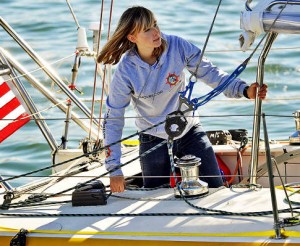14
Mental Monday: Extreme Encouragement
Before I left my teen years behind, I had three speeding tickets, one solo trip to Spain for a summer, and had jumped out of an airplane. To say I was adventurous (and obviously even reckless at times) is an understatement. I lived for an adrenaline-rush. I craved adventure. I occasionally attempted death-defying activities. I give thanks every day that I made it out of my teen years alive.
My parents didn’t encourage any of these activities. In fact, they made it a point to strongly discourage me. I give them most of the credit for helping me enter adulthood safe and sound.
When I read about 16 year old Abby Sunderland and her extreme goal to sail around the world solo, her behavior and drive didn’t really surprise me. Many, if not most, teenagers are adventurous and crave adrenaline-inducing activities. Many teenagers believe they have the maturity, skills, knowledge, and wisdom of most adults. If not more! Many teenagers believe they are indestructible and live their lives as if harm nor death can ever touch them. It takes a while for them to understand otherwise.
There is a developmental reason why teenagers still need parenting and guidance, especially when they are more inclined to risky and carefree behavior. Teenagers often lack the cognitive ability to make good decisions. Why? Because the adolescent brain is not yet fully developed. Research shows that the prefrontal cortex region of the brain, the area that processes complex cognitive functioning, behaviors, and decision-making skills, is the last part of the brain to mature. The prefrontal cortex, which handles planning, setting priorities, social behavior, weighing consequences, and suppressing impulses, is not fully developed until about the age of 25.
When children show talent and drive for something, even something as risky as sailing around the world solo, we should encourage them to take the time to hone and develop their skills. The same can be said for giving them the time to develop their cognitive functioning. Rushing development and cognitive processing is not only unwise, but can lead to disastrous consequences as well. When you put a child in a situation that calls for highly developed cognitive skills, critical decision-making tools, and the ability to suppress risky impulses, there will usually be consequences.
The parents of Abby Sunderland encouraged her dream to become a skilled sailor and there is no doubt that, at the age of 16, she is one already. Yet when they pushed and encouraged her to use that special talent in such a risky way, the world witnessed the rescue of distressed teenager in the middle of the Indian Ocean. No dream is big enough to be worth all of that. And it certainly isn’t worth encouraging.

[disclaimer]


